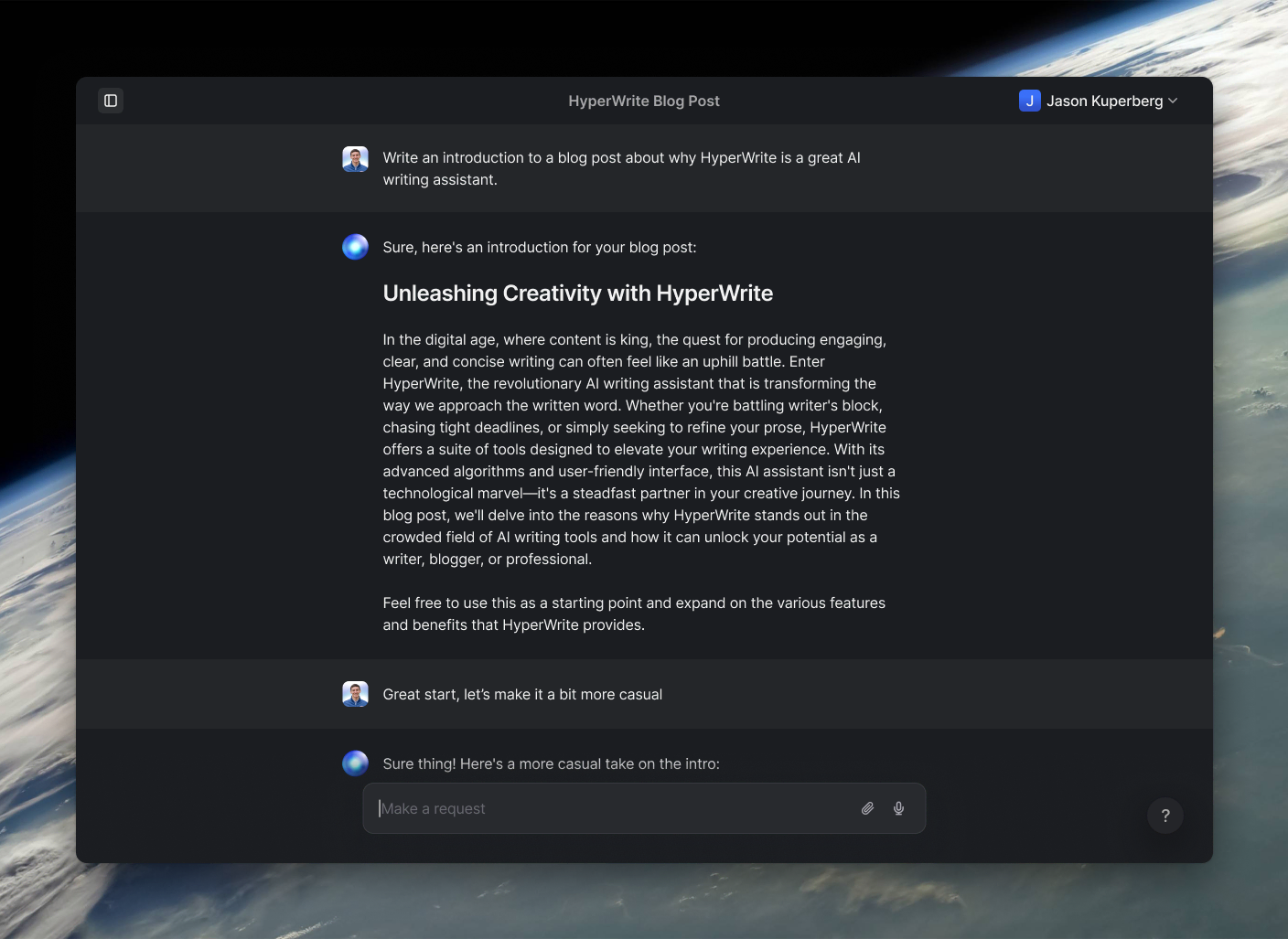
In college study, few challenges matter more than the night before an exam. Learning how to study the night before an exam can turn last-minute panic into a focused plan that helps you prioritize topics, use active recall and flashcards, manage time, and run quick practice tests. Want to cram smart and still sleep enough to perform well? This article lays out clear tactics to quickly master the most critical material the night before an exam, Study Tips for College, feel confident and prepared, and achieve high results without feeling overwhelmed or exhausted.
To put these steps into action fast, HyperWrite's AI writing assistant can create concise review sheets, craft targeted practice questions, and suggest a short study schedule so you focus on what matters and stay calm.
Summary
- Prioritize the highest-weight topics using a one-page checklist, as 85% of students report that reviewing notes the night before improves their performance.
- Use timed study rhythms to prevent burnout, for example, alternating 25 minutes of study with 5 minutes of break, repeated four times, or 50 minutes of research with 10 minutes of break. Keep topic blocks to 20 to 40 minutes with 5 to 10 minute rests.
- Active recall under pressure outperforms passive rereading, so create three flashcards every 30 minutes and practice with past questions, a strategy linked to an average 10-point score increase for students who attend cram sessions.
- Protect sleep and plan a brief morning review. Aim for seven or more hours of sleep, as students who slept at least 7 hours scored about 15% higher on average. Schedule a 30-minute pre-exam flashcard session.
- Design minimal memory aids that survive stress, using one concept per card, cloze-style prompts, and progressive explanations like one sentence, then 10 words, then 5 words to create robust retrieval cues.
- Treat energy as the limiting resource. Rely on small protein snacks and timed caffeine. Avoid caffeine within 4 hours of planned sleep. Restore alertness with a 20-minute nap or a 5-minute walk when fatigue sets in.
- This is where HyperWrite's AI writing assistant comes in, by auto-summarizing scattered notes into concise bullet points, generating targeted practice questions, and suggesting short study schedules that align with focused, timed review sessions.
How to Study the Night Before an Exam

You do three things tonight:
- Triage what matters
- Practice active recall on the weakest pieces,
- Set your morning so sleep actually helps
Stay organized, stay calm, and accept that you cannot learn everything from scratch. It’s not an all-nighter if you don’t start hearing the birds chirp. It’s a lifestyle. And sometimes, it is unavoidable.
Where Should You Start?
Set realistic expectations. Decide what a win looks like for tomorrow. Make a one-page checklist of the exam’s high-weight topics and the specific facts or problems you must recall. Review your weakest areas first. If you have practice questions, complete them before re-reading the notes.
Keep every action short and measurable:
- 20 to 40 minutes on a single topic, followed by a 5- to 10-minute break.
A quick fact to anchor this work: according to the University of the People, 85% of students find that reviewing notes the night before an exam helps improve their performance.
How Do You Structure Those Hours So You Don’t Burn Out?
Use timed blocks and dictate outcomes for each block.
Two practical rhythms work:
- 25 minutes of study, 5 minutes of break, repeated four times
- 50 minutes of study, 10 minutes of break
During breaks, stand up, drink water, and move your shoulders. Take short breaks to stay alert. Keep snacks light and protein-based. Avoid long stretches of passive reading; active tasks consistently outperform passive ones.
What Does “Active” Actually Mean in a Cram Session?
Turn notes into tests. Close the book and write what you remember, then check. Create three flashcards every 30 minutes and quiz yourself until you no longer flinch at forgetting.
Explain a concept aloud in one sentence, then in ten words, then in five. Practice under timed conditions, because exam pressure changes how you recall information. When you emulate the actual exam, you reduce surprise and build fluency.
Why Reorganize Information, and How Quickly Should You Do It?
Reorganize to shrink cognitive load. Convert long paragraphs into bulleted cause-and-effect chains, timelines, or formula sheets that you can scan in 10 seconds. If you are a visual thinker, make a single mind map for the unit. If you learn by speaking, record a 90-second explanation and play it back twice. The goal is not deep mastery tonight; it is reliable retrieval in the morning.
The Efficiency of Automated Study Aids
Most students default to flipping through scattered notes because it feels familiar. That works until you have an hour and fifty pages. The hidden cost is wasted time and a false sense of coverage, where you skim everything and remember nothing under pressure.
Platforms like HyperWrite change that bottleneck by auto-summarizing long notes into concise bullets, generating targeted practice questions, creating plain-language clarifications, and running quick citation checks, enabling focused review cycles that keep you on task instead of lost in scrolling.
How Should You Prepare For The Next Day?
Lay everything out. Pack your ID, pens, a neutral snack, and a full water bottle. Set multiple alarms and confirm travel time. Charge your devices and put your phone on Do Not Disturb with a single allowed contact. Plan a 30-minute review block for the morning, limited to flashcards or a one-page summary. If possible, aim for seven or more hours of sleep. According to Student News, students who slept for at least 7 hours before an exam scored 15% higher on average.
What Emotional Tradeoffs Should You Expect?
This challenge appears across midterms and finals: cramming raises stress because it compresses learning into a tiny window, forcing tradeoffs like sleep versus coverage. It’s exhausting when your brain feels full and every fact competes for attention.
That’s why prioritization and small wins matter. When you check one box, nail a practice question, or clear one concept, you reduce anxiety and build momentum.
Rules to Keep You Safe, Practically Speaking
Review your weakest areas first. Do active recall, not passive rereading. Use timed blocks and short breaks. Prepare your materials and your route. Avoid new material that you have never seen before; tonight is retrieval, not discovery. Don’t make coffee your only strategy; hydrate, eat lean protein, and breathe. Don’t do this too often.
Keep Your Confidence
You cannot make a semester in one night, but you can make tomorrow a successful performance. That belief changes what you choose to study and how you use your time.
That makes the night manageable, but the real test is turning that structure into a focused, high-yield cram session, and that’s what comes next.
Related Reading
- When Is the Best Time to Study for a Test
- What Is the Hardest Thing to Study in College
- Can AI Solve Math Problems
- How to Study in Med School
- Types of Study Methods
- How Long Should You Study for a Test
- How to Study for a Math Test
- Study Tips for High School
- Study Tips for Middle School
- Study Strategies for High School Students
Have an Effective Cram Session

A cram session is a short, intensive push to convert the most exam-relevant facts into retrievable knowledge, and it is appropriate only when you need to salvage performance for an imminent test. Focus on clarifying the exam’s structure, pick the smallest set of topics that will move your score, and use encoding techniques that force recall rather than passive reading.
What Should I Target First?
- Start by building a rapid exam map: list the topics that carry the most points, mark any items the instructor repeatedly emphasized, and scan past exams or homework for repeats.
- After coaching students through 48-hour cram windows, the pattern became clear: the lost hours come from chasing low-yield curiosities instead of focusing on the dozen items that actually determine the score; treat those dozen like mission objectives and clear them first.
According to the University of Arkansas, students who attend cram sessions score an average of 10 points higher on exams. Concentrating on high-yield content can produce measurable gains when time is tight.
How Do I Design Memory Aids That Survive Pressure?
Don’t make more notes, make better cues. Convert facts into cloze-style prompts and one-sentence application problems that require you to generate answers, rather than recognize them. Use vivid images or a single sensory hook per card to provide retrieval anchors, and turn lists into ordered mnemonics or brief narratives that you can mentally replay.
Keep cards minimal: one concept per card, one clear prompt, one concise answer. This reduces interference and speeds review when anxiety narrows your attention.
How Often Should I Test, and What Do I Do With Failures?
Test immediately after learning, then again after a short delay, and err on the side of more retrieval trials rather than more reading. After every failed recall, log the error in two columns: what you thought, and the most straightforward corrective fact or strategy.
Each error should spawn a new micro-card that asks for the correction in a different form. For exam types, practice the wrong mental habits: for multiple choice, practice eliminating distractors by writing down why each incorrect answer fails; for essays, memorize three scaffold sentences you can adapt to any prompt.
How Do I Manage Energy So The Brain Actually Stores What I Practice?
Treat energy as the limiting resource. Use small, protein-rich snacks and maintain steady hydration; avoid sugary spikes that lead to a crash. Time caffeine so it sharpens you for the next two hours of work, and prevent it within four hours of your planned sleep block.
When you feel foggy, take a 20-minute nap or a brisk 5-minute walk outdoors to restore your alertness quickly. Set your environment for sustained focus: bright light, minimal scrolling, and a single short playlist if auditory steady-states help you.
Transforming Study Habits with Auto-Summarization Tools
Most students panic and default to re-reading; that feels productive, but it is time wasted. The hidden cost of that habit is hours of false progress as context fragments across PDFs, notes, and screenshots.
Platforms like HyperWrite change that dynamic: they auto-summarize scattered notes into focused bullets, generate targeted practice questions from your material, and create plain-language clarifications so you spend minutes on retrieval drills instead of hours hunting for the signal.
How Do I Keep Momentum Without Burning Out?
Schedule short sprints of focused testing, then rotate topics so interference becomes a feature, not a bug; mixing subjects forces discrimination and improves transfer. Use a single “one-page cheat” for morning review, focusing on the three highest-yield prompts you need to recall cold, and then sleep or nap with confidence. When you revisit material after a break, always start by attempting to recall it from blank paper before consulting your notes; that single habit reveals what has stuck and what still needs work.
Prioritizing Sleep and High-Value Review for Study Consolidation
You’ll do best if you end the session by actively rehearsing only the highest-probability prompts one more time, put your materials away, and protect the next chunk of sleep so that consolidation can work its quiet magic.
That one simple shift changes everything about how last-minute study feels and what it actually yields and the next part explains a surprising tool that speeds this entire workflow.
Related Reading
- How Many Hours Do College Students Study per Week
- Good Study Habits for College
- Study Habits for High School
- How to Study for Finals in High School
- Different Study Techniques
- How to Study for a Final Exam
- How to Create a Study Schedule
- Scientifically Proven Study Methods
Try our AI Writing Assistant to Write Natural-sounding Content
You get why expecting AI to do the heavy thinking leads to frustration; the pattern I see across late-night study sessions and rushed drafts is clear, tools that do not match your voice feel like extra work, not help. Try HyperWrite with a free account.
Related Reading
- AI Activities for High School Students
- Best Study Tools for College Students
- Best Light Color for Studying
- Best AI Websites for Students
- Best AI to Solve Math Problems
- Best AI for Exams
- Best Study Methods
- Best Way to Study for a Test
- Best Study Apps for College Students

Powerful writing in seconds
Improve your existing writing or create high-quality content in seconds. From catchy headlines to persuasive emails, our tools are tailored to your unique needs.

